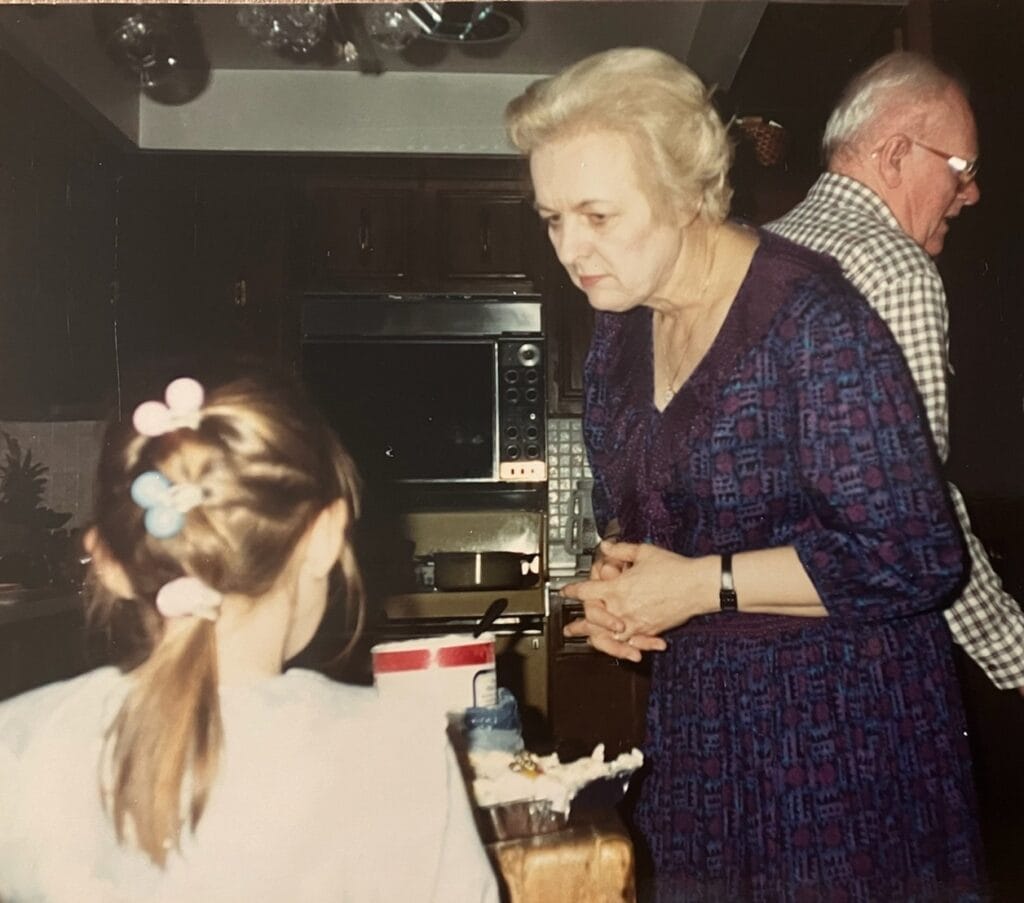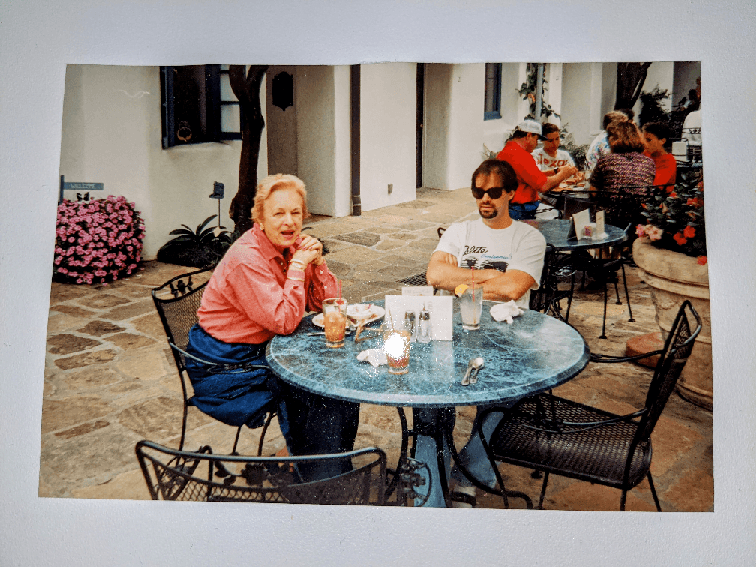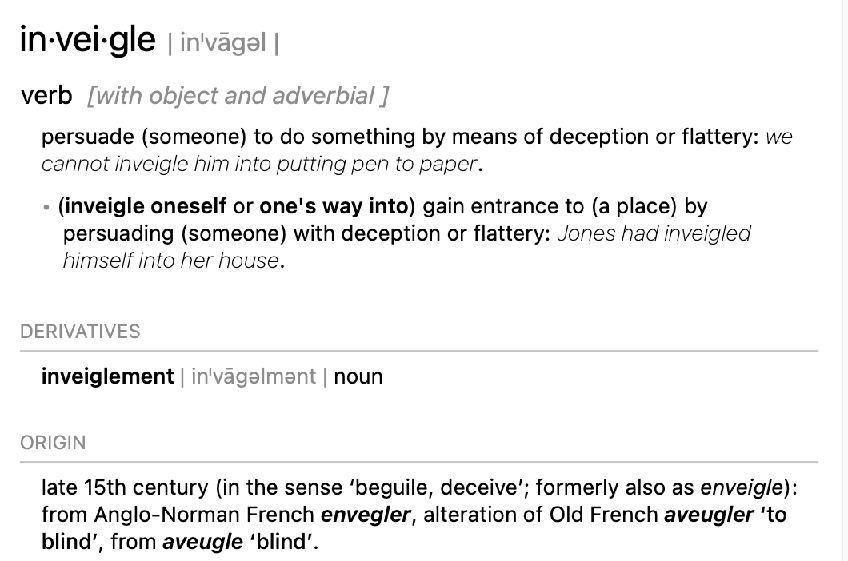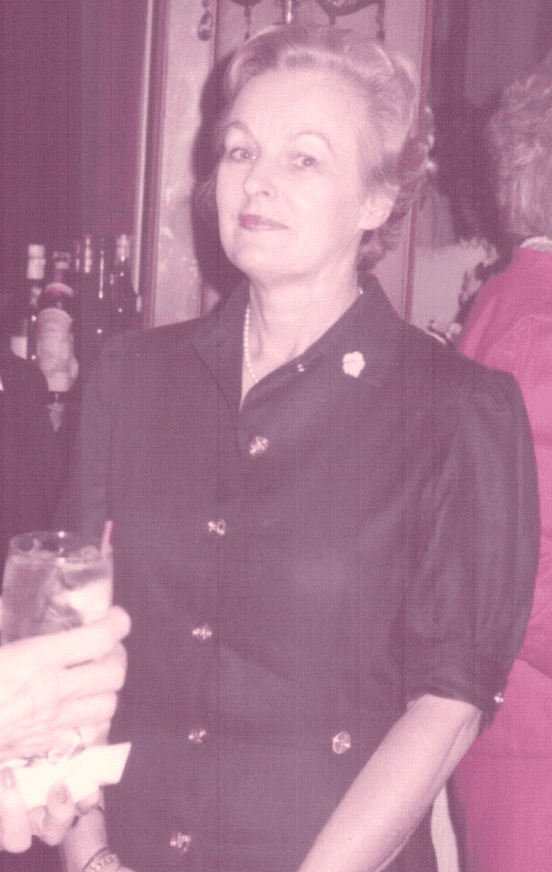Carolyn Poplett died on May 18, 2022. This is the eulogy I gave for her at First United Church in Oak Park on July 23rd, 2022.

Years ago, driving my parents out to O’Hare, suffering the critical presence of my father, who for some obnoxious reason had decided to sit in the back, positioned to keep an eye on the speedometer as I drove, a driver shot into traffic from an on-ramp and cut me off. I found the brake pedal just in time to avoid plowing into the back of his car.
Preempting the unhelpful words that my father was bound to issue, Carolyn blurted out, “Why…why, he’s just contributing to world rage.” To my teenage ear, that sounded like crazy talk. It would take decades before it occurred to me that this incident, as much as any other, typified a person with a profound conviction in the interconnectedness of things.
As far as people were concerned, my mother, your aunt, your friend, and your co-conspirator, was a connection machine. She made connections out of her abundant grace, reflexively, as it was utterly and thoroughly integral to her being. Going to the farmer’s market with mom felt like we were campaigning for an office she had already won. It very often went like this. “Oh, John, you remember so-and-so”. And I cringed. Of course, I didn’t. If Demosthenes knew all the names of all the citizens in the ancient city-state of Athens, Carolyn Poplett knew all the names of all the people living in Oak Park. It was just one of those things a connection machine does.
Carolyn, as her beautician friend, Carol, can tell you, was “magnetic”, the perfect word for mom if ever there was. It was easy to imagine, how when they went together to Parker’s restaurant, a shared favorite, men would abandon their spouses to see Carolyn safely to her car.
On her last visit to Ravinia, no doubt perfectly coiffed, lipstick carefully drawn, elegantly attired, nails painted a dark and alluring shade of red, Tony Bennett fell into a conversation with her that carried on so long his manager had to pry him loose. It wasn’t difficult to imagine how those two persons found each other even at a crowded, sprawling venue. Two magnetic people, their polarities lined up, a gentle, summer night, Sir Isaac Newton could have predicted it.
The most spectacular results to come out of AI, feats such as malignant tumor detection and self-piloting helicopters, come from so-called artificial neural networks.
How does a machine with a pittance of crude, imitation neurons so often outperform and outsmart human beings? Artificial neural networks don’t sleep, don’t get bored, don’t get distracted. They don’t take time off for meals or sex or watching Law and Order SVU. They don’t have attention deficit disorder. Above all they, never suffer trauma or its pernicious, crippling after-effects; they don’t have rage.
Carolyn Poplett was engaged in the most interesting piece of that conundrum. If the average human brain has 86 billion neurons1Cherry, “How Many Neurons Are in the Brain?”, an almost infinite capacity for connectedness, why aren’t human beings more deeply connected to their humanity?
I think she understood how trauma damages the soul and when persons damage each other emotionally or rob a person of their innocence, neurons are damaged. Our capacity for self-love, a healthy autonomy, self-actualization, our capacity to love others, is cut back, diminished, compromised. The human connections we need to thrive become more tenuous and fragile, unstable, more difficult to maintain.
In Dante’s Paradiso, the poet postulates that it is God’s love which makes the world spin round and that love is the prime mover2Paradiso, Canto 27 106-111.:
The nature of the universe, which holds the center still and moves all else around it, begins here as if from its turning-post. This heaven has no other where than this: the mind of God, in which are kindled both the love that turns it and the force it rains.
Sometimes towards the end, I whimsically began to think of Carolyn as the prime mover. I mean, there she was, sitting in front of the television in her jammies, content to watch reruns of Gunsmoke or the cable series, Mountain Men, yet there was always a fantastic swirl of energy around her. And when Georga Parchem called, and Jim, Allison, Mary Ann, and Erin got involved with this year’s spring benefit at the 19th Century Club, where Carolyn would be the guest of honor, she barely moved but seemed to be the force of a great national convergence that brought friends, nieces and nephews, fellow club members, colleagues from Thrive, in brief, an adequate sample of all the people she had loved, together in a single ballroom.
Fully three years after her husband died, Carolyn confided to me that she had decided to live. That revelation came as a total shock. I knew that she was grieving, I could not have guessed she had gone fully to a “to be or not to be” level of despair per the soliloquy. Well, now, finally it is obvious. The high cost of being a connection machine is that when you lose connections you cherish, the suffering is magnified by this cultivated knowledge of their value. And Carolyn I wager had plenty of her neurons, a healthy swath of her 86 billion neuron allotment, devoted to her husband, Ray, probably more than any other person.
Human neurons do not observe the boundaries of the human skull or body. They are promiscuous. They interconnect with neurons in the minds and bodies of other people. That is a trick that artificial networks haven’t quite learned yet. The two flames merging into one metaphor, that charming trope of youthful weddings, actually happens at the level of synapses and neurons. So, the loss of a loved one, a significant other, is exactly the same as the sturdy chop of a cleaver slicing through a bundle of nerves. That is why it took Carolyn three years to decide she wanted to carry on. Half of her, it must have seemed, was gone.
Yet we know that the human brain is plastic and that neurons can eagerly repurpose to new tasks. So, the only adequate answer to grief is to do as Carolyn would have us do. Maintain as many connections as diligence allows and whenever possible, form new ones.
- 1Cherry, “How Many Neurons Are in the Brain?”
- 2Paradiso, Canto 27 106-111.


